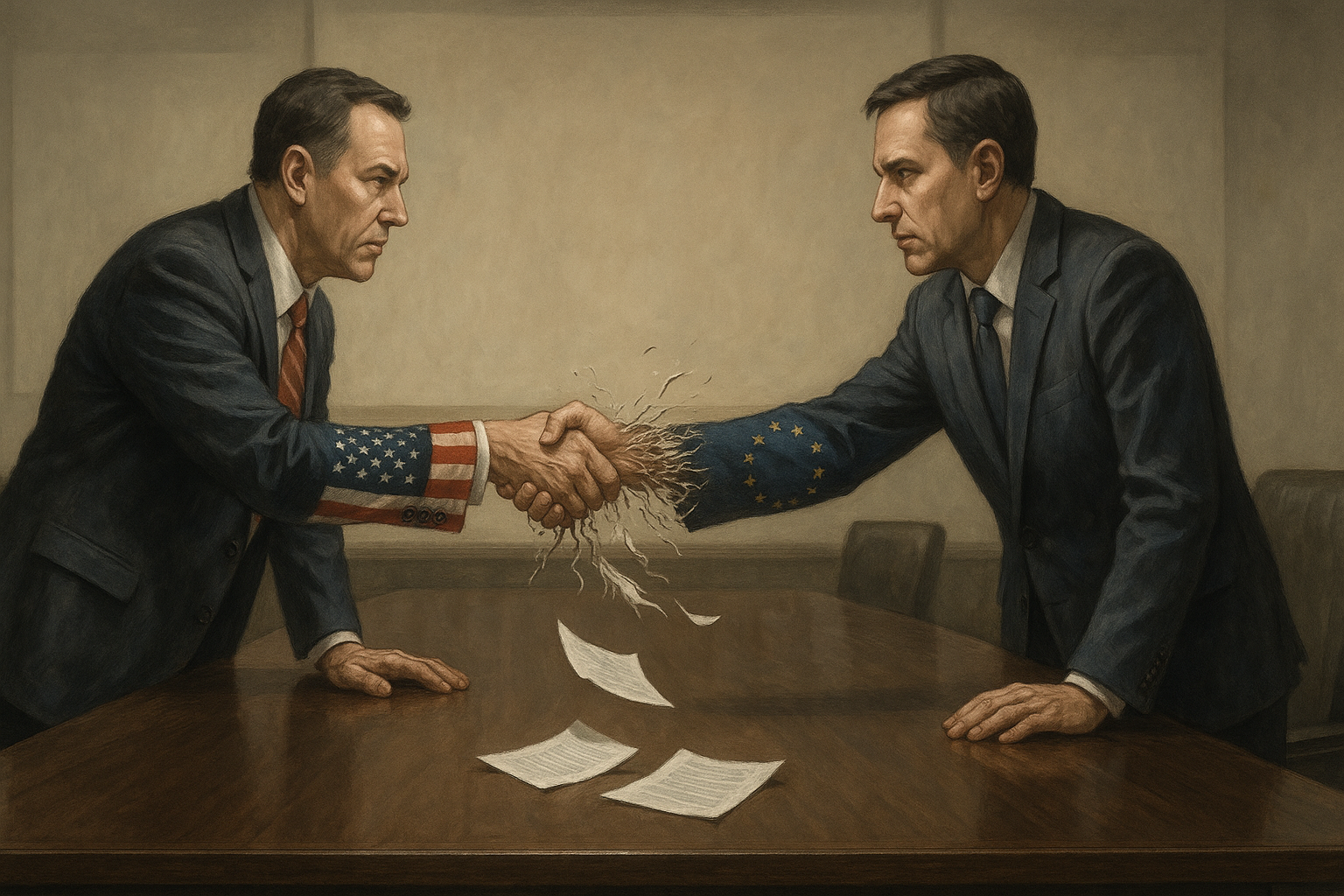Well, that was quick.
For those keeping score at home, it took precisely 48 hours for the much-heralded trade deal between the United States and European Union to unravel like a cheap sweater. According to German newspaper Handelsblatt, what looked like a ceasefire in the transatlantic trade tensions has already been relegated to the diplomatic dustbin.
I mean, most marriages at least make it past the honeymoon phase before the fighting starts.
The speed of this collapse speaks to what I call the "Announcement Premium" in international relations - the tendency for politicians to extract maximum public relations value from announcing a deal while leaving the messy details for later. It's remarkably similar to how companies announce "strategic partnerships" that often amount to little more than two CEOs shaking hands at a conference.
Here's how these things typically work: Leaders meet, preferably with dramatic lighting and important-looking documents. Handshakes are exchanged. Press releases tout "historic breakthroughs" and "new chapters" in bilateral relations. Markets briefly react. Then reality sets in as negotiators actually try to implement whatever vague principles their bosses committed to in front of the cameras.
This EU-US situation follows the pattern with almost comical precision. The ink wasn't even dry on whatever napkin they sketched this deal on before both sides started arguing over what they'd actually agreed to.
The collapse shouldn't surprise anyone who's been paying attention to the underlying dynamics. Trade negotiations between major economic blocs aren't just about tariff percentages - they're complex three-dimensional chess games involving domestic politics, industrial policy, and geopolitical positioning.
Look at the fundamental misalignment of incentives here. The Biden administration needs to appear tough on trade to counter Republican criticisms while simultaneously maintaining European support on Ukraine and other global issues. European leaders need to protect their industrial base without further antagonizing their most important security guarantor during a period of heightened geopolitical tension.
Square that circle. I'll wait.
What's particularly fascinating is how these trade tensions reveal the growing contradiction between security alliances and economic competition. During the Cold War, security and economic integration among Western allies were mutually reinforcing. Today, they increasingly pull in opposite directions.
The Europeans have their own version of this tension. They want American security guarantees against Russia while simultaneously developing "strategic autonomy" and protecting themselves from American economic dominance. It's like wanting your cake, eating it too, and also asking the baker to stand guard outside your house while you eat it.
There's a historical parallel worth noting. In the 1930s, the Great Depression sparked competitive devaluations and tariff wars that economists later dubbed "beggar-thy-neighbor" policies. Each made sense individually but collectively deepened the global economic crisis. Today's policymakers are at least aware of this history, which may explain why these trade conflicts remain relatively contained despite the rhetoric.
The real question here isn't whether this particular deal survived, but whether the transatlantic economic relationship can find a new equilibrium that acknowledges both sides' legitimate interests. The old model of American-led economic liberalization with European participation is clearly failing, but its replacement remains undefined.
For markets, this stop-start pattern of trade tensions creates exactly the kind of uncertainty that drives volatility. Companies with significant cross-border operations can't plan effectively when the rules might change with each election or diplomatic spat.
I've spoken with several executives at multinational corporations recently who describe their strategy as "planning for everything and committing to nothing" - hardly a recipe for efficient capital allocation or long-term investment.
So what happens next? The most likely outcome is a series of limited, sector-specific agreements rather than any comprehensive trade deal. Think of it as trade diplomacy by a thousand paper cuts rather than one grand bargain.
In the meantime, expect more posturing, more announcements of breakthroughs that break down upon examination, and more confusion for businesses caught in the middle. The EU-US economic relationship is too important to fail completely, but apparently also too complicated to fix quickly.
Which, when you think about it, is a pretty good description of most long-term relationships.




